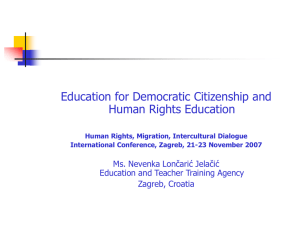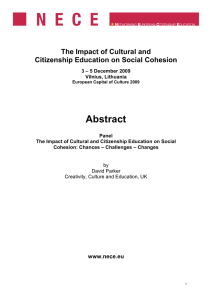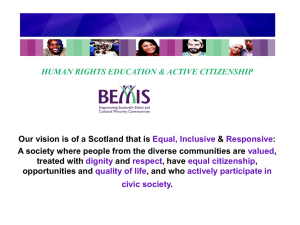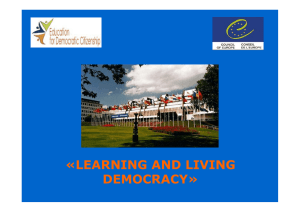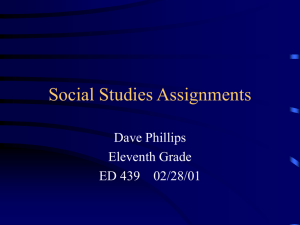Input The Impact of Cultural and Citizenship Education on Social Cohesion
advertisement
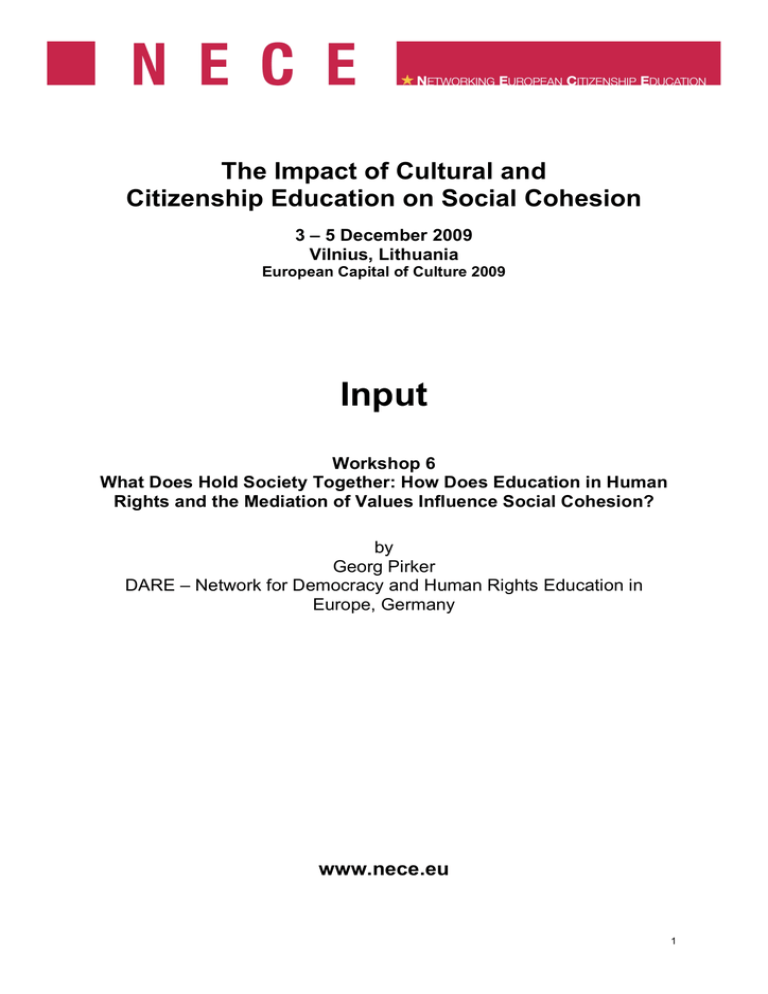
The Impact of Cultural and Citizenship Education on Social Cohesion 3 – 5 December 2009 Vilnius, Lithuania European Capital of Culture 2009 Input Workshop 6 What Does Hold Society Together: How Does Education in Human Rights and the Mediation of Values Influence Social Cohesion? by Georg Pirker DARE – Network for Democracy and Human Rights Education in Europe, Germany www.nece.eu 1 “What’s holding society together: How Do Education for Democratic Citizenship and Human Rights Influence Social Cohesion?”. To be honest with you – to answer this question is quite a challenge. I therefore will try to give you an input that critically reflects on some basic facts that form on the one hand the political frame for Human Rights Education in Europe and which comes up with the challenge(s) connected to the demand for social cohesion in societies within Europe on the other hand. I speak here as a representative of the DARE network of various fifty Non-Governmental Organisations from about thirty European countries that are devoted to Education for Democratic Citizenship and Human Rights. Without going too far into the deep and diverse individual situation for EDC/ HRE in the single countries, I would rather like to summarize some general remarks analysing the interconnection of both fields of non-formal education with issues of social cohesion. Our last survey among member organisations from September 2009 produced these results: There is almost in no country an interconnection on the political level between EDC/ HRE and issues of social cohesion – despite the fact that EDC/ HRE work should be targeted on vulnerable/ marginalised groups. And there seems to be almost no sound strategy on the political level in any state to respond with Education for Democratic Citizenship and Human Rights to social issues that might enable people for social mobility. In the field of Human Rights Education and Citizenship Education we assume a huge impact of non-formal educational settings on individual perceptions/ social behaviour of individuals which is in the long run of effect for the social cohesion of democratic societies as a whole – unfortunately it is hard to be backed by scientific research that covers all Europe. So from this perspective it is hard to give a valid presentation about the interconnection of social cohesion and EDC/ HRE (some data are available from the IEA surveys). Participation, inclusion, recognition, legitimacy – when we as EDC/ HRE educators, talk about the impact on social cohesion we have to refer to the frame of lifelong learning as well as to specific frames set on the political level that determine access, inclusion and participation in societies: As a frame on the political level in Europe there are on the one hand the various decisions and documents adopted by the Council of Europe – the last and in my opinion most important one is the draft European Charter on Education for Democratic Citizenship and Human Rights Education (Eaton at al: COE EDCHR Ad Hoc Working Group, 2009) – since it especially reflects on the role of non-formal education. On the other hand, on the level of the European Union there is a bunch of political statements randomly and occasionally referring to Human Rights, to Active Citizenship, to European Citizenship and – newly – to the Fundamental Rights within the EU. If connected to political strategies, we recently face in the EU a more and more functionalistic definition of non-formal education as a helping hand of formal education (e.g. The new European strategy for Youth 2009-2018). For me, this causes the first challenge: When taking social cohesion in Europe into account, we refer in EDC/ HRE – without even going to the level of single states – at least to two political entities which have implicit or explicit barriers between themselves: The EU member states and the wider group of COE States. Just to mention EU neighbourhood policy, European migration of workers, (undocumented) migration as huge issue of its own, EU Frontex agency, EU Freedom, Justice and Interior policy (since 1st Dec. with genuine EU responsibilities). Here we face rising barriers that exclude people from the wider COE sphere. This has not only consequences for EU funded EDC/ HRE projects but far beyond for the interaction of people. At this stage it cannot be foreseen whether the Lisbon Treaty will reduce these barriers or create even new ones. We face a contradiction of internal and external EU strategies which causes a credibility risk for HRE: On the one hand, social inclusion is demanded and 2 supported through policies and grant programmes within the EU and for EU citizens (ESF, EY2010, et al.), but at the same time exclusion strategies are developed and practiced at the EU boarders and against non-EU citizens. With the Lisbon Treaty the EU has formally adopted the charter of fundamental rights – which is not the same as signing the Universal Charter for Human Rights. I assume that this will have further consequences for the future development of HRE and EDC within Europe. Already within the Schengen States, Human Rights count only fully for the citizens inside. It must be feared that due to policies practised within the EU and towards non-EU states, Human Rights Education and Civic Education will get a credibility problem within the frame of the EU. The constant further development of policy fields, as we currently observe it by Human Rights vs. Fundamental Rights, tend to water down the issues of Human Rights – thus for Human Rights Education – in general. What we have learned from the side of Human Rights and Democratic Citizenship Education in Europe is that Human Rights demand justice based on values: This results in equal opportunity – not only focussed on individual responsibility (for better employability) but also for the inclusion and participation of all people within their societies. This needs to be guaranteed by at least a state frame. What we experience at the moment is a threat for solidarity, as single states more and more fail to ensure standards of social justice, while the EU has no right to develop a substituting frame – the launch of a European constitution has failed, as we all know. These standards count for all fields of life: for Gender Equality, for a peaceful co-existence of cultures in (individualised) societies, they count for chances for inclusion and participation, for the further development of democracy and for civilization standards, for work and for times of unemployment. They somehow do not seem to count for the risk of getting poor or being socially excluded. In Europe we experience a strong influence of “globalisation” – here I just refer to Phil Woods’ input at the opening of the conference – on democratic structures, on values, on nation state institutions as well as on forces holding societies together. This influence is often driven by the economic argument of being competitive with other regions in the world, with negative consequences for the people. May I ask: Is lifelong learning in this context being reduced to open up the markets for learners or to open up the learners for the markets? Europe cannot work without its citizens. Social cohesion in Europe guarantees democratic values and human rights, which are the forming elements of our societies. In this regard the reduced view on competitiveness on markets is a dangerous reduction. Sunday speeches always emphasize solidarity, cohesion et al, but the driving force is economic competitiveness. All arguments towards the European level that do not refer to the competitiveness of the EU as a whole are used to constantly being turned down to member states issues – following the principle of subsidiarity. Even in Europe, Democracy and Human Rights cannot be taken for granted, they need to be constantly defended and argued for. All over Europe we currently face increasing political extremism, xenophobia, right wing extremism, violence and hate crimes, resentment – coming from the middle of societies. This allows us to draw conclusions on the political culture that drives Europe at the moment, I would also agree with Phil Wood that we really risk losing citizenship. Therefore social inclusion in the EU needs: - Lifelong learning (LLL) of social and civil skills: These skills are defined in the 2006 LLL competences and demanded in the EU’s Lifelong Learning Strategy. Out of the eight Goals of the LLL Strategy in Education and Training only four are being implemented in the formal education system, only one is about to reach the 3 benchmarks adopted by the EU until 2011. The central measure developed by the EU to implement the LLL Strategy is the European Qualifications frame/ NQF. It is developed based on the European key competences but does not refer to the whole field of civic and social skills. “These key competences are all interdependent, and the emphasis in each case is on critical thinking, creativity, initiative, problem solving, risk assessment, decision taking, and constructive management of feelings.” - The EU spends a lot of money on measuring skills and competences on increasing active citizenship by initiating European debates and mobility, empowering people of all age to explore their European identity. In this regard, studies undertaken by CRELL and other research institutions are extremely important. But how does it help us to know about the percentage of active citizenship if participation is not practised on the level of policymaking. The elections for the European parliament show us a declining democratic legitimacy of decision makers not only on the level of the European Union. Not to mention the democratic legitimacy of the European Commission and the Council of Ministers. - Opportunities for using civil skills through social and political participation in practice: Inclusion and participation should not be limited to the labour market! Europe should be a core field to experience political participation. European policy should not be the key playground for lobbyists, regardless of all steps that are being undertaken to raise participation. - And last but not least it needs knowledge and enforcement of social rights through Human Rights Education. At the moment the active citizen is expected to mutually support all EU decisions. She/ he is expected to participate in a workforce and in an abstract social sphere, but far less expected and supported to participate in the political sphere. - The structure of the Lifelong Learning programme is especially in regard to nonformal education a contradiction itself. On the one hand the EU calls for complete learner orientation and empowerment for participation, on the other hand it uses the EQF/ NQF as a political instrument meant to achieve measurable results, indicated in advance. Learner orientation and inclusion means also to be open towards learning outcomes and processes The current economic crisis threatens social inclusion and challenges Human Rights Education. At present, European citizens make the experience that as tax payers they have to pay for the irresponsible behaviour of their political representatives. They make the experience that the political level is not able to control and balance the financial markets and the people working there. Rights and values promoted through EDC/ HRE are counteracted on both the EU and member states level. Instead of fostering citizens’ participation and debating core values of democratic behaviour and social responsibility, future generations are heavily indebted. Why should citizens vote if they have little say in this? 4
